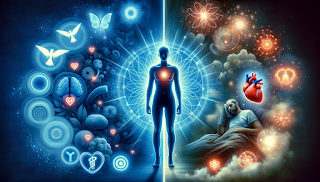
Sleep along with regular exercise and a balanced diet is considered a basic foundation of a healthy lifestyle. If you do not get a recommended 7-9 hours of sleep at night, it may lead to various health issues like high BP and being overweight.
Most people have their concerns about how sleep actually impacts your overall health. To understand this properly, let’s take a look at different aspects of sleep and its effect on your well-being.
Physical Effects Of A Bad Night’s Sleep
When you do not sleep properly at night for a long period, it leads to various physical issues. People also get heart problems from bad sleeping cycles.
Even if you miss a good sleep for just a few nights, it leaves a severe impact on your whole body. When your body does not get an adequate amount of sleep, it starts releasing stress hormones. These hormones increase the blood pressure and heart rate.
Your brain and body can bear the consequences of two or three sleepless nights. However, if you extend your sleepless night schedules for months, it leaves a serious impact on your mental health, cognitive functionalities, and heart health.
Eating Impact Our Sleep
It is proven that some substances, particularly caffeine, have a negative impact on your sleep cycle. Whereas, some foods have a significantly positive impact on your sleep quality.
Studies show that fish, kiwi, malted milk, and cherries have a beneficial and positive impact on your sleeping health. Moreover, various studies also concluded that consumption of overall healthy and nutritious food, not just certain food increases your sleep time and reduces the time of falling asleep.
Sleep For Younger Children
Sleep is crucial for the health of every single part of your body. It is particularly beneficial for children and their minds and body are in a state of growing and developing. Children who have poor sleep cycles and low-quality sleep are often linked with difficult learning behavior. They have a lower ability to learn and memorize information which results in poor eating behavior and obesity.
Health Benefits Of A Good Sleep
Sleep does not waste your time. It is an important time when most of the crucial body processes happen. A good sleep at night benefits you and your health in a variety of ways:
-
Brain Processing
Sleeping allows you to store and maintain memories inside your brain. You usually do not remember things that you have learned when you were awake due to less sleep. Sleep also enables you to regulate and reflect your emotions. This is the reason why you feel moody and irritated when you did not have a good sleep last night.
-
Tissue Repair
Your body works hard to repair itself during your sleep by releasing hormones and proteins that aid restore damaged and broken tissues and muscles. If you do not sleep properly, it slows the healing and repairing process of your body. The repairing of tissues and muscles is particularly crucial for athletes to gain muscle mass and recover from intense physical activity.
-
Immune System Function
Sleep also improves your natural ability to battle against illness. When you sleep, your body starts generating cytokines which are crucial proteins to trigger the immune system to reduce inflammation in the body.
Moreover, researchers also believe that lack of sleep enhances the production of WBCs in your body. It is the same reaction that your body normally shows under stress. The imbalance in the immune system leads to chronic diseases like cardiac disorders.
How To Catch More ZZZz?
Sometimes, you really want to sleep properly for a long time during the night, but your mind does not allow you to do so. Unfortunately, falling and staying asleep is a challenging process. Here are some effective tips that help you fall asleep naturally.
- Set Yourself Up For Success: Ensure that the place where you're going to sleep is dark, quiet, and cool. Do not consume caffeine before going to bed. Avoid using screens and bright lights. If you have an evening workout routine, try to do it 2-3 hours before sleeping.
- Don’t Panic: The more you think about not falling asleep, the harder it gets for you to sleep. Do everything that makes your night and rest comfortably and do it without getting worried.
- Treat Medical Problems: if your sleep pattern still does not get better after the incorporation of a healthy diet, exercise, and lifestyle habits. Then visit your doctor. Because there is a high chance of another medical factor that is making it hard for you to sleep. Common health issues that may affect your sleep are thyroid disorder, sleep apnea, and chronic pain.
- Consider Your Stressors: find out the stressors and triggers that are impacting your sleep duration. Anxiety, depression, and stress are common issues that force you to turn and toss throughout the night.
- Be Boring: if you are not falling asleep, then get up and go outside. Do something really boring but stay away from screens. This way you get to sleep faster.
- Treat Insomnia: For insomnia, contact an expert cognitive behavioral therapist.
Alcohol Impacts Sleep
Alcohol apparently makes you fall asleep faster, but it affects the quality of your sleep. It often leads to disrupted sleep patterns. It is advised to drink several hours before sleeping so that you will be sober when you go to sleep. This way it does not have any effect on your sleep system.
Screen Time Impact Sleep
Various studies show evidence that the use of a screen before bed negatively impacts your sleep. Screens emit blue light which affects the production of melatonin in your body. Melatonin is a hormone that signals the body to sleep.
Another reason is the type of content you watch on screen. If you watch emotionally driven content like sad, horror, or depressed content, it affects your sleep ability. Sleep experts advised to not use screens before going to bed. Instead of using a screen, do some relaxing activities or read books in light illumination.
Conclusion
Sleep plays a crucial role in our overall health. Sleep is linked with our physical, emotional, and mental well-being. If we do not sleep properly, especially at night, it leads to various health issues like heart problems and disturbed hormones. Moreover, it also increases stress, depression, and anxiety. Therefore, eat nutritious food, do relaxing exercise before going to bed, and avoid screen use
